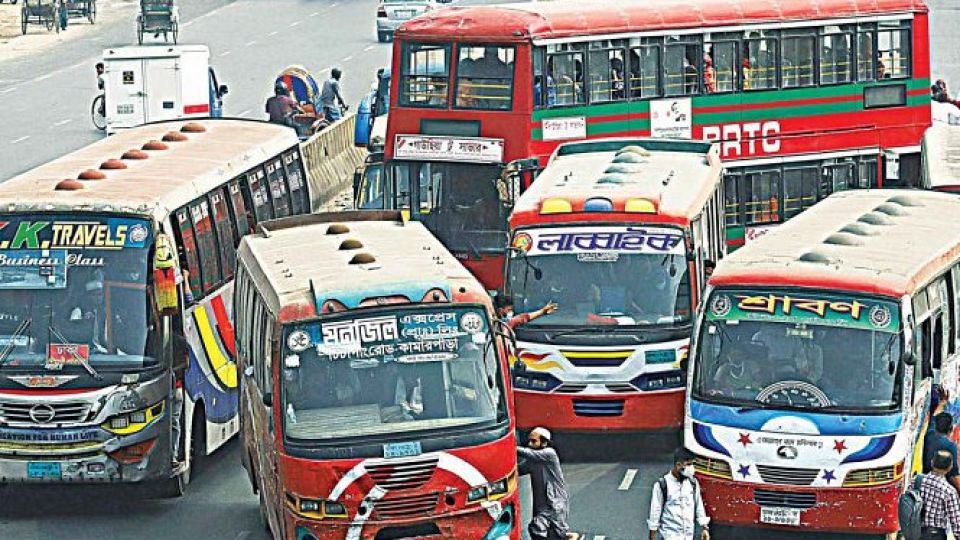March 6, 2024
DHAKA – Buses pay at least Tk 1,059 crore in illegal tolls and bribes every year, according to the Transparency International Bangladesh.
A section of unscrupulous Bangladesh Road Transport Authority (BRTA) officials and staffers, police officers, transport associations, staffers of city corporations and municipalities, and people affiliated with political parties get shares of the bribes and extorted money, said a research report of the TIB.
However, the Tk 1,059 crore was a “very conservative estimate” and that the real figure could be many times more, the TIB said while unveiling its findings at a press conference at its Dhanmondi office yesterday.
It found that people with political affiliations were directly involved in the governing bodies of 92 percent of bus operators.
Of those people, 80 percent belong to Awami League and they often influence policies and ensure benefits for themselves and bus operators, it said.
“The private bus service sector is plagued by irregularities from top to bottom … This sector is kept hostage by the associations of owners and workers,” said Iftekharuzzaman, executive director of TIB.
Workers are not getting their benefits and passengers the expected services, he added.
The TIB carried out the research titled “Integrity in Private Bus Transport Business” between May 2023 and February 2024. It collected information from 701 transport workers, 168 representatives of bus operators or associations, and 696 passengers on travel between September 11 and October 2023.
It also interviewed 37 stakeholders and monitored 51 bus terminals.
It did not include BRTC buses in its survey.
Researchers Md Nuruzzaman Forhad, Farhana Rahman, and Mohammad Nure Alam read out the summary of the findings at the press briefing.
Bus owners and workers have to bribe to get services from the BRTA, TIB said.
Over the last year, bus owners had to spend an average of 30 days, instead of a maximum of 14 days, to get their vehicles registered. They had to bribe an average Tk 12,272 for every vehicle, it said.
They had to spend 13 days on average, instead of the stipulated one to two days, to renew fitness certificates and had to bribe an average Tk 7,635 for each vehicle, it said.
For renewing route permits, they had to wait an average of 45 days, instead of the maximum of 20 days. They also had to bribe an average Tk 5,999, it said.
Over 28 percent of the surveyed workers said they have been accused in one or more cases filed by traffic police or highway police in connection with violating traffic rules.
By bribing police, many owners and workers avoid fines and keep unfit vehicles on roads, operate buses on routes they are not supposed to operate, and avoid requisition of their vehicles by government officials, it said.
About 29 percent of the workers said they bribed traffic or highway police.
On average, each long-haul bus paid Tk 1,019 in bribes over the last one year and regional buses paid Tk 1,133. City buses paid a staggering Tk 5,656, it mentioned.
Of the Tk 1,059 crore paid by privately operated as bribes and illegal tolls, Tk 900.59 crore went to BRTA officials for services, Tk 24.97 crore went to people with political clout, Tk 33.48 crore went to workers of city corporations and municipalities and political leaders, Tk 87.57 crore went to traffic and highway police, and Tk 12.76 crore went to transport owners’ and workers’ associations, it said.
Asked whether the officials and staffers of the BRTA were the only recipients of the bribes or ministry officials also got a cut, Iftekharuzzaman said it was difficult to say. “However, it is assumed that a section of the BRTA officials and staffers gets the money and it is an open secret. As the higher authorities [above the BRTA] is failing at curbing corruption, it could be asked whether a portion of the money goes to them,” he said.
Workers’ associations are failing to uphold the rights and interests of the workers due to their involvement in politics, the report read.
These organisations, taking the side of the owners, go on strikes to change the law, have their leaders released from jail, and to increase bus fare keeping the passengers hostage.
They collect Tk 30 to 50 for each trip of buses in the name of management fees, but the fund management lacks transparency, it said.
Ruling party activists lead most of the bus owners’ associations, it said, adding that the leaders, who do not even own buses, hold key position in such associations, it said.
Contacted, Khondaker Enayet Ullah, secretary general of Bangladesh Road Transport Owners’ Association and also the vice-president of Dhaka South City Awami League, termed the TIB report “fabricated”.
Association President Moshiur Rahman Ranga is a former Jatiya Party lawmaker.
Enayet told this correspondent yesterday that there was no political influence in the activities of their organisation.
He said police fine vehicles owned by AL and BNP leaders just like they do for vehicles owned by others.
Enayet claimed that he was not aware of the allegations of bribery against BRTA and police officials and that some people, not affiliated with transport organisations, were extorting buses at terminals.
Contacted, BRTA Chairman Nur Mohammad Mazumder said all services are now delivered online and that there was no scope for bribery and corruption.
“We will hold a press conference tomorrow [Wednesday] to protest the TIB report,” he told this correspondent last night.
Asked about the allegation of bribery against traffic and highway police, Enamul Haque Sagor, assistant inspector general (media) of Police headquarters, said he was not aware of any such report.
“However, our stance is very firm and clear about any kind of bribery. Our stance is the same irrespective of the identity [of the accused],” he told The Daily Star yesterday.
The TIB issued 15 recommendations, including legal action against individuals engaged in extortion on the roads and
those responsible for irregularities and corruption.


